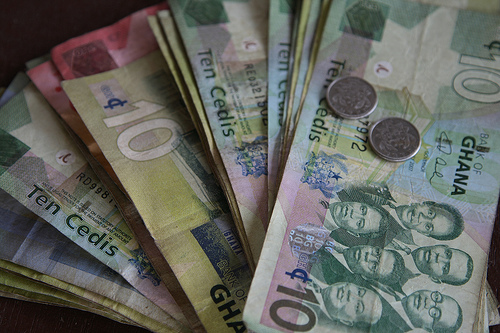
Cedi ends 5-weeks rally against US dollar
The cedi outperformed the US dollar but tumbled against the euro and the British pound in the week ending June 2.
The dollar was weighed by multiple negative sentiments, prompting it to slip against a basket of currencies on the international forex market. The cedi exchanged GH¢4.29 per dollar with a year-to-date depreciation of 2.20 per cent in the week under review.
The British pound, however, outstripped the local currency despite its fluctuation on the international forex market. The local currency thus depreciated by 0.44 per cent to trade at GH¢5.53 per pound. It closed with a year-to-date depreciation of 6.43 per cent.
The euro outperformed the local currency albeit its gloomy outlook on the international currency market. The 19-bloc currency was weighed down by geopolitical fears and downbeat inflation data in the Eurozone. Geopolitical fears arising from Greece opting out from a bailout payment agreement upset the European Union wing to its potential to rekindle a discussion for Greece leaving the Union. This coupled with fall in inflation from 1.9 per cent in April to 1.4 per cent in May weakened the euro on the international market.
The cedi, however, failed to benefit from this development as it depreciated by 0.66 per cent to trade at GH¢4.84 per euro. The year-to-date depreciation of the cedi thus stood at 9.13 per cent.
Stock exchange
The Ghana Stock Exchange failed to close higher as the effects of laggards on the indices were unable to be subdued by the advancers. The Composite Index retreated by 0.24 per cent to an index level of 1,918.94 points while the GSE Financial Stock Index declined by 0.37 per cent to 1,796.2 points.
The year-to-date return on the indices thus settled at 13.61 per cent for the GSE Composite Index and 16.23 per cent for the GSE Financial Stock Index.
Total trade
In spite of the indices closing in the red, trading activities were much rousing than witnessed in the previous week. Total traded volume soared up by 310.97 per cent to 4.96 million shares.
The week’s trade was valued at GH¢8.52 million. Guinness Ghana Brewery Ltd, Total Petroleum Ltd, UT Bank Ltd were the most actively traded stocks, accounting for 68.93 per cent of total trade.
Market capitalisation, however, declined by 0.39 per cent to GH¢58.76 billion.
Price movements
Price movements were observed in six equities; three advancers and three laggards.
Standard Chartered Bank gained 10 pesewas to close at GH¢16.10 per share.
Fan Milk Ltd and Benso Oil Palm Plantation Ltd also rose by 2 pesewas and a pesewa to close at GH¢11.54 and GH¢3.56 per share, respectively.
On the list of laggards, Ecobank Transnational Incorporated lost a pesewa to trade at 11 pesewas per share. GCB Bank Ltd and Mechanical Lloyd Company Ltd also shed a pesewa each to close at GH¢5.23 and 10 pesewas, respectively.
Commodities
Brent crude tumbled this week on the international commodities market, following the decision by US President Donald Trump to pull America out of the Paris climate change deal.
This spiked fear and anxieties as it could undermine efforts by OPEC production to curb the global supply of the commodity.
Brent crude shed US$2.15 to trade at US$50 per metric ton, a figure below the OPEC’s benchmark of US$53.00 per barrel.
Gold gained US$8.64 at the close of trading, with most of its gains emerging after the release of the unexciting America’s employment data which significantly weighed down the value of the greenback.
Gold thus traded at US$1,276.74 per ounce.
The price of Cocoa recorded a weekly gain of US$84.5, as climatic conditions in Côte d'Ivoire threatened the supply of the commodity.
The rise in the value of the soft crop was also due to the hoarding of the commodity by some farmers as some said the unit price was not attractive. This resulted in inadequate supply on the global market. Cocoa thus traded at US$1,995.5 per metric ton.
Coffee fell by four cents on the back of upbeat forecast in Brazil, which indicated a better-than-expected coffee production in the coming days. Coffee, which closed trading at US$1.27 per pound, was also supported by the weakening of the Brazilian currency, the real.